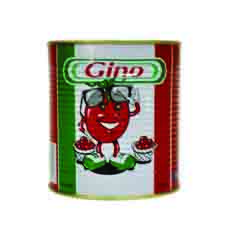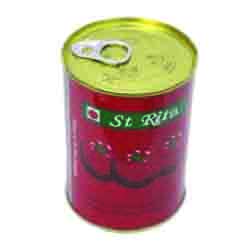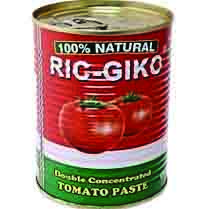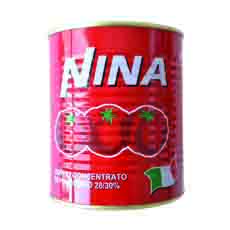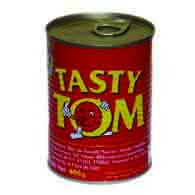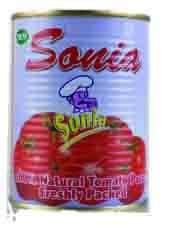Virtually everyone will agree that one of the important things about Tomato paste is their kitchen-ready nature, whether packaged in tins, cans or sachets. Tomato paste is simply refined tomato concentrate made into thick paste-like forms, and either used as a substitute for actual fresh tomatoes or to augment it in meals. Tomato paste is a convenient staple you will want to keep handy and has very similar nutritional value to fresh tomatoes since it is simply tomatoes in processed concentrated forms. Even though tomato paste is a good source of antioxidants like Lycopene, which gives tomatoes their reddish colour and helps fight against free radicals and oxidative stress, there remain health concerns especially regarding imported tin tomatoes from China (THISDAY, 10 Aug 2015) which many experts have said contain little or no Lycopene, and the reddishness in many cases is achieved by addition of colouring, which is often difficult for the body to dispose of, and many eventually accumulate to cause cancer, hypertension and other diseases. There is also Bisphenol-A, a harmful chemical used to coat the linings of most tin and plastic products, and considering the high level of acidity in the products, consumers need to consider each of these brands before consumption. Presently, there are numerous tomato paste brands in the Nigerian market, all competing for visibility and market share. This report focuses on the popular tin tomato pastes of 400g size and similar size equivalents.
- Gino Tomato Paste: Gino is one of the leading Tomato paste brands in the Nigerian market. It is a product of GB Foods Company and has been around longer than many of the other tomato paste brands.
Strengths
- It is one of the pioneering brands in the Nigeria market
- It tastes well in meals and has a good thickness
- It comes in other variants such as Gino pepper and Onion mix
- It is a fast-selling brand as confirmed by many dealers
- It has a minimum lifespan of 2-years before expiration.
Weaknesses
- At N280 per 400g, Gino is way more expensive than many of the other brands of the same size
- It has an unusual dark-red colour (scarlet red) which raised the concern of some consumers about the product’s contents
- Clappa Tomato Paste:
Strengths
- It has a bright red rose colour and an appealing appearance
- Its paste appears thick; which is to the delight of many consumers
- It is one of the well-known brands in the market
Weaknesses
- It has a sour-like acidic taste (similar to cherry fruit), which often changes the taste of the meal
- At N270 per 400g, its price ranked among the most expensive in the market
- Even though it is known widely, it tends to be very rare in shops and stores.
- De Rica Tomato Paste: De Rica is a product of Olam group, distributed by Caraway Food International Limited. It is one of the leading brands in Nigeria and is available in both tin and sachet variants.
Strengths
- It tastes well in meals
- It is free from the sour taste known with many other brands
- The paste thicknesses is good enough
- It has a lifespan of 2years before expiration.
Weaknesses
- Its popularity in recent time has steadily declined due to many competition
- The 400g size goes for N280, making it one of the most expensive brands in the market
- St Rita Tomato Paste: St Rita tomato paste is a product of Boarding Erican Limited.
Strengths
- The paste is thick, brightly red, and taste good in meals
- Its tin package has a finger lifting component that makes it easy to open
- At N250 per 400g size, it is relatively cheaper than most other brands in the market
Weaknesses
- It has an unusual scarlet-red colour not appealing to many consumers
- It is ill marketed, and scarcely available in retail shops
- Ric-Giko Tomato Paste: Ric-Giko is a flagship product of Ersco Food Limited. It is one of the favourite brands in the market for its fresh tomato-like taste
Strengths
It has a unique fresh tomato-like taste
- It is very thick, and best used in jollof rice
- It appears to weigh more than other pastes of equivalent size
- It has a finger lifting component that makes it easy to open the tin
- It has expiration lifespan of 2 years like many other brands
Weaknesses
- It has a sour-like acidic taste of cherry fruit that can alter the taste of meals
- Even though it is somewhat popular, Ric-Giko is still struggling for popularity and shelf spaces in many shops and markets.
- Nina Tomato Paste: Nina tomato paste is an Italian brand, packaged in Nigeria by Estate Interbiz Limited. It has a brightly rose-red colour and is best used for stew making.
Strengths
It is has a red-rose colour which comes out best when used for stew
- It is very affordable for every income class as the 400g size is sold for N250
Weaknesses
- It has a sour-like acidic taste that may alter the taste of meals
- The quality of its thickness is second-best when compared to other brands
- Tasty Tom Tomato Paste: Tasty Tom is a product of Nutrifoods Ghana Ltd, distributed by Caraway Food International Limited in Nigeria.
Strengths
It has a bright red colour and is tasty in meals.
- It falls among the cheapest brands, typically selling around N250 in many shops
- Its tin has a finger hold cap for ease and convenience of opening
Weaknesses
- Like many other brands, it also has an acidic sour taste that alters the taste of the meal
- It is not so thick, and liquefy easily once its seal is broken
- It is quite scarce in malls, but available in major markets
- It has a useful lifespan of just 1 year, compared to other competitors with an average of 2 years
- Sonia Tomato Paste: Sonia Tomato paste is a product of Sonia Foo Industries Limited of Nigeria.
Strengths
- It is tasty in meals, particularly jollof rice.
- In reality, it appears to weigh more than many other 400g tomato pastes
- It sells around N250 in retail shops/stores
- Weaknesses
- It is not so thick and easily liquefies once its seal is broken
- It is scarce to come-by outside the South-West region of Nigeria.
- While thickness, redness, and taste are major considerations for a good number of consumers of tomato pastes, the issue of whether or not they are substandard and adulterated with colouring and starch remains additional concerns, especially since Nigeria still imports various processed tomato pastes, regardless of its economic position as the largest producer of tomatoes in Sub-Saharan Africa.

